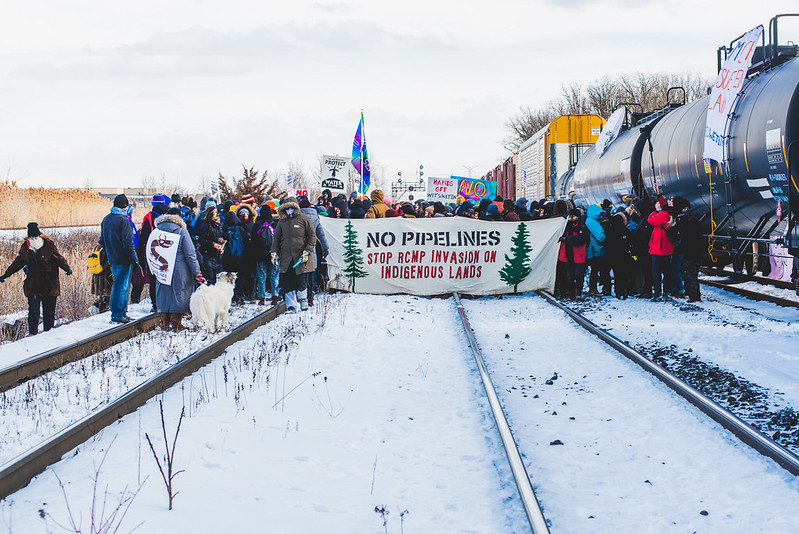“Facebook is actively suppressing those who oppose fascism and the colonial capitalists,” said one First Nations activist.
By Brett Wilkins, staff writer for Common Dreams. Published 9-22-2020

Wet’suwet’en Solidarity Event – Rail Yard near Pioneer Village Station Blockaded – Vaughan, Toronto, Ontario – February 15, 2020. Photo: Jason Hargrove/flickr/CC
Environmental groups reacted with confusion and anger after Facebook temporarily suspended their accounts over the weekend, just days after the social media giant announced an initiative aimed at combating climate misinformation.
The Guardian reports some of the largest and most respected progressive groups—including Greenpeace USA, Rainforest Action Network, and Climate Hawks Vote—were among the hundreds of accounts of Indigenous, climate, and social justice organizations that Facebook suspended.
According to Greenpeace USA, other affected groups include: Presente.org, Rising Tide North America, Seeding Sovereignty, Stand.earth, United For Respect, Wet’suwet’en Access Point on Gidimt’en Territory, Wet’suwet’en Solidarity U.K., and many others.
Greenpeace said the affected people and organizations were informed that they would be blocked from posting on Facebook for three days due to violations described as “copyright infringement.” As of Monday, dozens of the affetced accounts had not been reinstated, the group said.
Press Release: Facebook suspends hundreds of accounts associated with online event targeting Coastal GasLink Pipeline investor @KKR_co in solidarity with #Wetsuweten
Facebook is trying to silence us in our fight and take away our freedom of speech.https://t.co/Ul4LQzzRky
— Gidimt’en Checkpoint (@Gidimten) September 21, 2020
Facebook explained in a statement to The Guardian that the affected accounts had been “mistakenly removed” by its systems, and that “they have since been restored, and we’ve lifted any limits imposed on identified profiles.”
All of the affected accounts have one thing in common: the groups or individuals all took part in a May 2019 Facebook event targeting KKR & Co., a U.S. private equity firm and majority funder of the 416-mile (670 km) Coastal GasLink pipeline being built in northern British Columbia. Greenpeace said that the affected accounts were blocked a day ahead of another scheduled online protest against KKR.
🚨IMPT: Yesterday, hundreds of Wet’suwet’en frontline and solidarity activists organizing against the Coastal GasLink pipeline, INCLUDING RAN, were blocked from @Facebook due to a May 7 event targeting @KKR_Co
— RAN (@RAN) September 20, 2020
Yesterday, 100s of #Wetsuweten frontline & solidarity activists & organizations organizing against Coastal GasLink pipeline were blocked from @Facebook due to a May 7 event targeting @KKR_Co, a major pipeline funder, a project opposed by Wet’suwet’en Hereditary Chiefs. pic.twitter.com/FnmttEegsM
— Presente.Org (@PresenteOrg) September 21, 2020
“We are not surprised by the actions that Facebook has taken,” Delee Nikal, a Wet’suwet’en band member of the Gitdimt’en clan from the Witset First Nation, said in response to the suspensions. “This once again exposes the white supremacy inherent in the system. Videos of extreme violence, alt-right views, and calls for violence by militias in Kenosha, Wisconsin, are allowed to persist on Facebook, yet we are banned and receive threats for permanent removal, for posting an online petition.”
“Facebook is actively suppressing those who oppose fascism and the colonial capitalists,” Nikal continued. “We have to remember this also shows the power that we have as a collective: Our voices were heard by KKR and it was threatened enough to take legal action. What we are doing is working. The defund actions will continue. We will continue to live on our territories as we always have and protect our territories for future generations.”
Greenpeace USA executive director Annie Leonard said in a statement that “fossil fuel companies and their funders will use every tool in their toolbox to attempt to silence us.”
“But they are struggling to counter the Indigenous-led resistance to end our addiction to oil and gas and instead respect Indigenous sovereignty,” she continued. “We are fighting drawn-out and expensive legal battles, laws that make righteous protest illegal, and aggressive law enforcement in response to peaceful protest.”
“Enlisting powerful and underregulated tech giants to do their bidding and silence dissent might be the latest tool, but it is no match for our movement,” Leonard added.
The Coastal GasLink pipeline has drawn intense opposition from many Wet’suwet’en First Nations people, whose territory it will cross. Some Wet’suwet’en support the project.
Over the past two years, Wet’suwet’en Earth protectors have been repeatedly attacked by Canadian authorities protecting pipeline interests, despite a 1997 Canadian Supreme Court ruling affirming that the Wet’suwet’en had not given up their homeland in the province, even after centuries of European settler colonization and sometimes violent dispossession.
“The pipeline is set to cut through sovereign Wet’suwet’en land, defiantly ignoring assertions from the hereditary chiefs of their rights, title, and consent for the project,” said Greenpeace. “The project would lock us into decades of increased fracked gas and the impacts to climate, air, water and the risks posed to Indigenous girls, women, and two-spirit people by man camps built along the route.”
Dozens of Wet’suwet’en people and their allies have also been arrested at solidarity protests across Canada that have affected the nation’s rail transportation.
The Facebook suspensions came just a few days after the company launched a “climate science information center” with the goal of “tackling climate misinformation.” However, some critics say the company has not done enough to truly combat climate change denialism, with some activists citing a 2018 video denying that human activity is causing global heating that was viewed five million times on Facebook.
Facebook has also been accused of designating false or questionable articles and posts about climate change as “opinion,” exempting them from being blocked by the company’s fact-checkers.
“Actions speak louder than words and once again Facebook has taken actions that are in stark contrast to public statements from the company,” Elizabeth Jardim, senior corporate campaigner at Greenpeace USA, told The Guardian.
Facebook has also come under fire in recent months for marking factual articles and posts about the coronavirus pandemic as “spam,” and for censoring—and not censoring—certain content.

